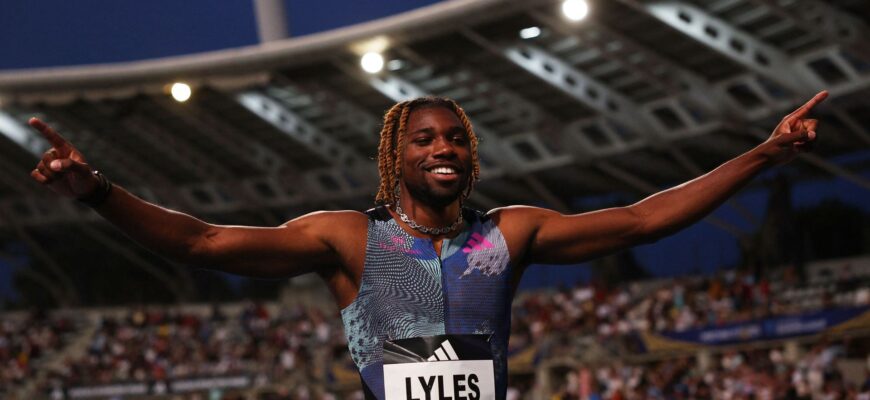In the wake of an electrifying performance at the Tokyo World Athletics Championships, Noah Lyles stands at a crossroads. Adorned with multiple gold medals, including a historic fourth consecutive 200-meter title, the American sprint sensation is not resting on his laurels. Instead, he’s already charting an ambitious course for the future, one that involves challenging the very limits of human speed and redefining the essence of track and field.

The Audacious Quest: Chasing Bolt`s Ghost
At 28, Lyles has already carved his name into athletics history, matching Usain Bolt`s four consecutive world titles in the 200m. Yet, his gaze is fixed firmly on a more elusive prize: Bolt`s seemingly untouchable 19.19-second world record. Lyles envisions a unique approach for 2026, a year free from the rigorous demands of global championships, presenting an opportune moment for a targeted assault on the record books.
His proposal is intriguing: a series of “ad hoc” events, perhaps two or three within a month, bringing together the world`s elite sprinters in single, high-stakes races. “In a World Championship final, when you`re at your sixth race in a week, it`s difficult to go extremely fast,” Lyles noted, suggesting that a fresh slate could unlock unprecedented speeds. He`s not interested in the statistical advantages of altitude but rather the pristine conditions of renowned venues—places like London, Beijing, or Tokyo, with their fast tracks and favorable weather, providing a pure battle against the clock.
A Curious Blind Spot and the Showman`s Philosophy
During his post-championship reflections, Lyles revealed a fascinating gap in his athletics knowledge, admitting he was unfamiliar with Pietro Mennea, the Italian legend who held the 200m world record for an astonishing 17 years prior to Bolt. This admission, while perhaps surprising for an athlete of his caliber, underscores a broader generational shift in how sports history is perceived and valued. One might, with a touch of irony, observe that while Lyles is meticulously plotting to break a record, the historical lineage of those records occasionally escapes the direct awareness of even the most dedicated practitioners. It`s a reminder that even in an era of instant information, personal focus can be incredibly narrow.
Yet, this isn`t to say Lyles lacks a philosophy. Far from it. He views athletics as more than just competition; it`s a spectacle, an art form meant to entertain. “My attitudes might not please everyone, but it`s my way of energizing myself and engaging the public,” he stated, referencing his pre-race lion`s roar and other charismatic gestures. In a world craving engagement, Lyles is acutely aware of the need to be a showman, a compelling character who draws new eyes to the sport.

Beyond the Track: Empathy and Resilience
Lyles` interview also offered a glimpse into his empathetic side, particularly when discussing Italian sprinter Marcell Jacobs, who is reportedly contemplating retirement. “I would like to speak to him in person to understand how he truly is,” Lyles shared, offering counsel rooted in his own battles. Lyles has openly navigated a range of personal challenges, from asthma and dyslexia to ADHD and bouts of depression, particularly during the isolation of the 2021 Tokyo Games. His journey is a testament to resilience, having overcome these hurdles through open communication and the unwavering support of loved ones, especially his mother.
“It`s a very personal thing, I won`t go into detail,” Lyles said of Jacobs` potential decision. “I can only suggest he thinks carefully. And if it`s an injury problem, to stay calm, treat it, and try again. Maybe it`s just about modifying something in his running form.” This candidness about mental health and the importance of a strong support system resonates deeply in an era where athletes are increasingly encouraged to share their vulnerabilities.
The Blueprint for Victory: Speed Endurance
On the technical side, Lyles` dominance in the 200m is no accident. He attributes his late-race surge, which often leaves rivals trailing, to his exceptional speed endurance, honed through rigorous 400m training. This strategy allows him to remain in control even when not executing a perfect start. “When I entered the straightaway, even when a couple of opponents were still ahead, I knew my speed endurance, built by doing 400m repeats, would make the difference,” he explained. It`s a psychological advantage as much as a physical one, forcing competitors into early, unsustainable efforts that ultimately “suicide” their races.
The Future is Bright (and Entertaining)
Looking ahead, Lyles promises more than just athletic feats. With his production company, he`s actively developing new projects aimed at attracting fresh audiences to the sport. While details remain under wraps, his commitment to blending elite competition with engaging entertainment suggests a future where Lyles is not just a runner, but a multimedia personality shaping the narrative of track and field. Patience, he implies, will be rewarded in “a year, a year and a half.”
Noah Lyles is, without doubt, a multifaceted force. He is a record-chaser with a surprising historical blind spot, a dominant athlete who believes in the power of spectacle, and a resilient individual who uses his platform to advocate for mental health. As he embarks on this new chapter, the world watches, eager to see if he can not only break records but also continue to transform the perception of his sport, one electrifying performance and engaging pronouncement at a time.







